Case Study Analysis: Mrs. Edward's Education Pedagogy Approach
VerifiedAdded on 2023/01/20
|7
|1582
|26
Case Study
AI Summary
This case study examines Mrs. Edward's educational pedagogy, focusing on her facilitator approach, STEM-based learning, and project-based learning methods. The analysis delves into her teaching style, emphasizing the structured curriculum, emphasis on knowledge acquisition, and the use of various teaching approaches to engage students. The study highlights the influence of the MAKER profile, identifying the dominance of method and knowledge in her teaching. Furthermore, the case study explores the application of theories from educational psychologists like Nathaniel Gage and the concepts of experiential learning. It also touches upon the liberationist approach, emphasizing the importance of student's self-worth and the nurturing of their inquisitive nature. References to theorists such as Carl Rogers and Abraham Maslow further enrich the discussion. Overall, the case study offers a comprehensive understanding of Mrs. Edward's teaching philosophy and its impact on student learning.
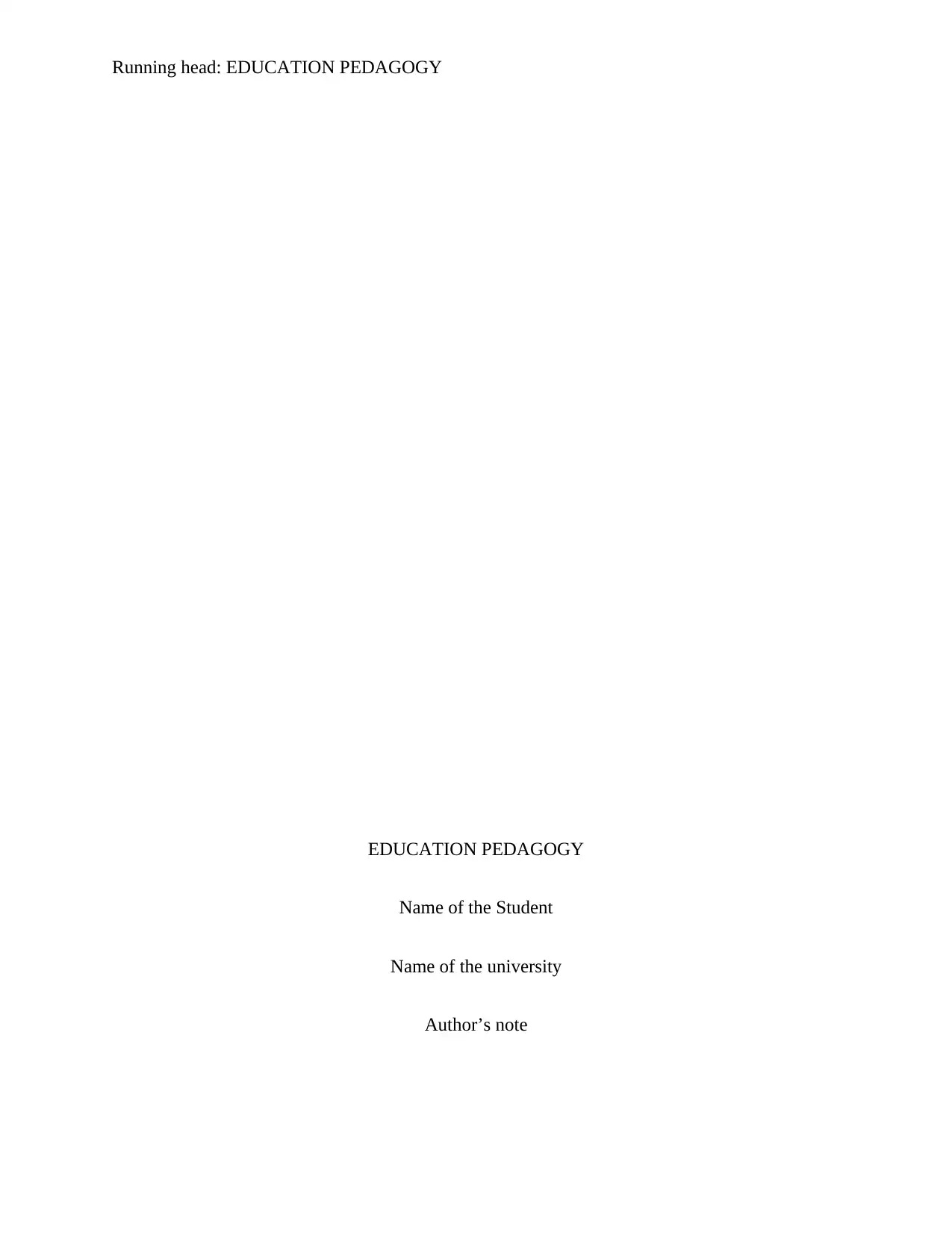
Running head: EDUCATION PEDAGOGY
EDUCATION PEDAGOGY
Name of the Student
Name of the university
Author’s note
EDUCATION PEDAGOGY
Name of the Student
Name of the university
Author’s note
Paraphrase This Document
Need a fresh take? Get an instant paraphrase of this document with our AI Paraphraser
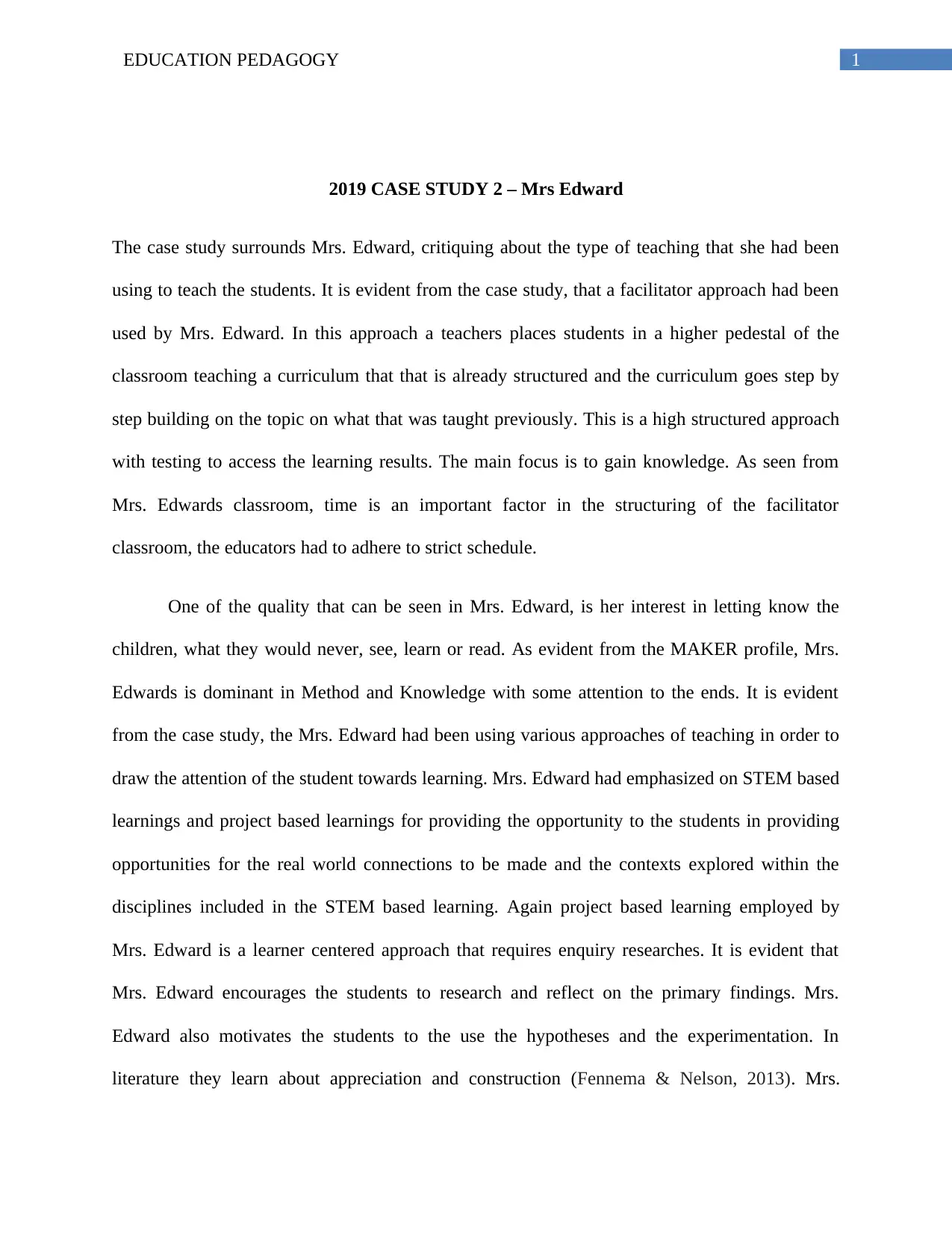
1EDUCATION PEDAGOGY
2019 CASE STUDY 2 – Mrs Edward
The case study surrounds Mrs. Edward, critiquing about the type of teaching that she had been
using to teach the students. It is evident from the case study, that a facilitator approach had been
used by Mrs. Edward. In this approach a teachers places students in a higher pedestal of the
classroom teaching a curriculum that that is already structured and the curriculum goes step by
step building on the topic on what that was taught previously. This is a high structured approach
with testing to access the learning results. The main focus is to gain knowledge. As seen from
Mrs. Edwards classroom, time is an important factor in the structuring of the facilitator
classroom, the educators had to adhere to strict schedule.
One of the quality that can be seen in Mrs. Edward, is her interest in letting know the
children, what they would never, see, learn or read. As evident from the MAKER profile, Mrs.
Edwards is dominant in Method and Knowledge with some attention to the ends. It is evident
from the case study, the Mrs. Edward had been using various approaches of teaching in order to
draw the attention of the student towards learning. Mrs. Edward had emphasized on STEM based
learnings and project based learnings for providing the opportunity to the students in providing
opportunities for the real world connections to be made and the contexts explored within the
disciplines included in the STEM based learning. Again project based learning employed by
Mrs. Edward is a learner centered approach that requires enquiry researches. It is evident that
Mrs. Edward encourages the students to research and reflect on the primary findings. Mrs.
Edward also motivates the students to the use the hypotheses and the experimentation. In
literature they learn about appreciation and construction (Fennema & Nelson, 2013). Mrs.
2019 CASE STUDY 2 – Mrs Edward
The case study surrounds Mrs. Edward, critiquing about the type of teaching that she had been
using to teach the students. It is evident from the case study, that a facilitator approach had been
used by Mrs. Edward. In this approach a teachers places students in a higher pedestal of the
classroom teaching a curriculum that that is already structured and the curriculum goes step by
step building on the topic on what that was taught previously. This is a high structured approach
with testing to access the learning results. The main focus is to gain knowledge. As seen from
Mrs. Edwards classroom, time is an important factor in the structuring of the facilitator
classroom, the educators had to adhere to strict schedule.
One of the quality that can be seen in Mrs. Edward, is her interest in letting know the
children, what they would never, see, learn or read. As evident from the MAKER profile, Mrs.
Edwards is dominant in Method and Knowledge with some attention to the ends. It is evident
from the case study, the Mrs. Edward had been using various approaches of teaching in order to
draw the attention of the student towards learning. Mrs. Edward had emphasized on STEM based
learnings and project based learnings for providing the opportunity to the students in providing
opportunities for the real world connections to be made and the contexts explored within the
disciplines included in the STEM based learning. Again project based learning employed by
Mrs. Edward is a learner centered approach that requires enquiry researches. It is evident that
Mrs. Edward encourages the students to research and reflect on the primary findings. Mrs.
Edward also motivates the students to the use the hypotheses and the experimentation. In
literature they learn about appreciation and construction (Fennema & Nelson, 2013). Mrs.
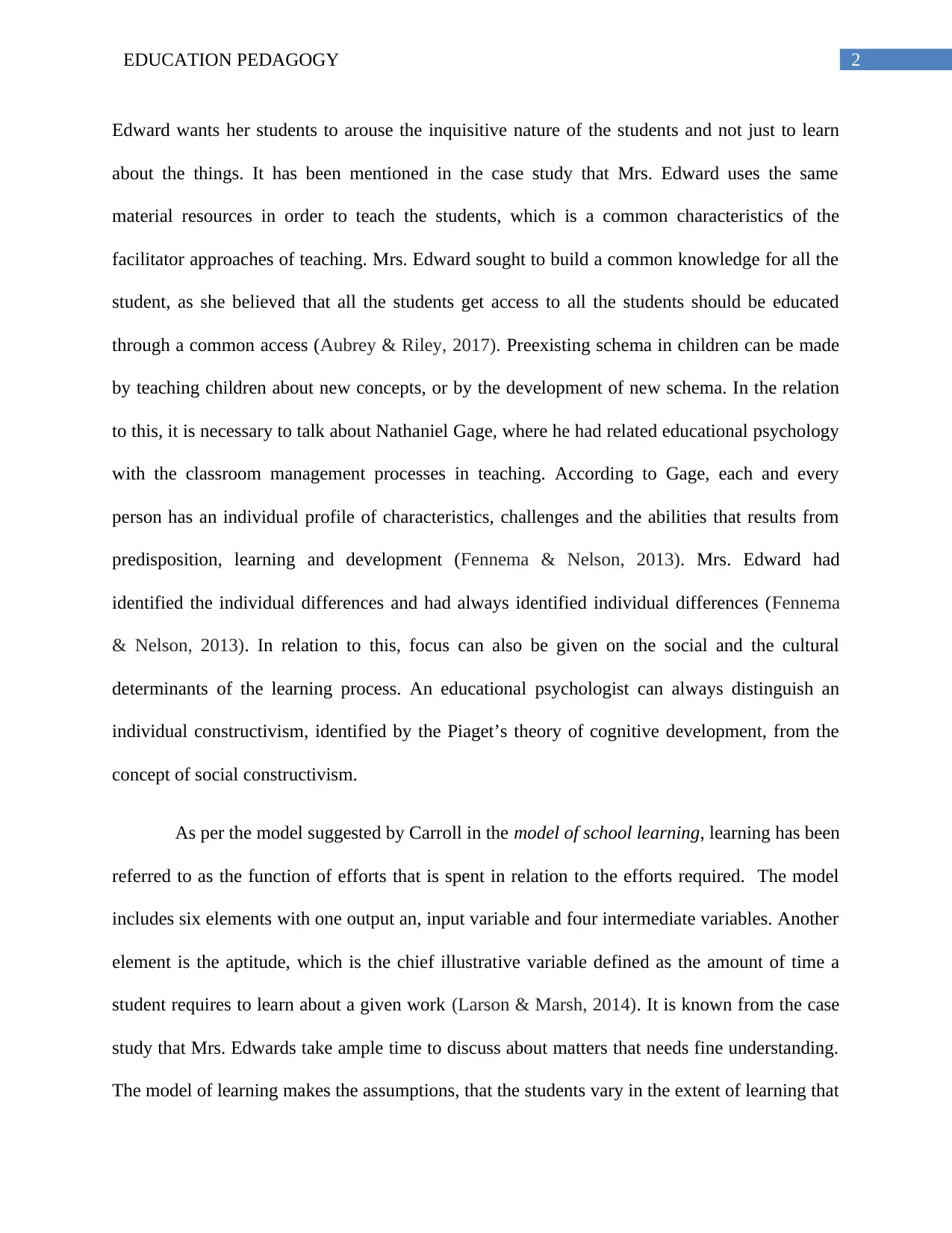
2EDUCATION PEDAGOGY
Edward wants her students to arouse the inquisitive nature of the students and not just to learn
about the things. It has been mentioned in the case study that Mrs. Edward uses the same
material resources in order to teach the students, which is a common characteristics of the
facilitator approaches of teaching. Mrs. Edward sought to build a common knowledge for all the
student, as she believed that all the students get access to all the students should be educated
through a common access (Aubrey & Riley, 2017). Preexisting schema in children can be made
by teaching children about new concepts, or by the development of new schema. In the relation
to this, it is necessary to talk about Nathaniel Gage, where he had related educational psychology
with the classroom management processes in teaching. According to Gage, each and every
person has an individual profile of characteristics, challenges and the abilities that results from
predisposition, learning and development (Fennema & Nelson, 2013). Mrs. Edward had
identified the individual differences and had always identified individual differences (Fennema
& Nelson, 2013). In relation to this, focus can also be given on the social and the cultural
determinants of the learning process. An educational psychologist can always distinguish an
individual constructivism, identified by the Piaget’s theory of cognitive development, from the
concept of social constructivism.
As per the model suggested by Carroll in the model of school learning, learning has been
referred to as the function of efforts that is spent in relation to the efforts required. The model
includes six elements with one output an, input variable and four intermediate variables. Another
element is the aptitude, which is the chief illustrative variable defined as the amount of time a
student requires to learn about a given work (Larson & Marsh, 2014). It is known from the case
study that Mrs. Edwards take ample time to discuss about matters that needs fine understanding.
The model of learning makes the assumptions, that the students vary in the extent of learning that
Edward wants her students to arouse the inquisitive nature of the students and not just to learn
about the things. It has been mentioned in the case study that Mrs. Edward uses the same
material resources in order to teach the students, which is a common characteristics of the
facilitator approaches of teaching. Mrs. Edward sought to build a common knowledge for all the
student, as she believed that all the students get access to all the students should be educated
through a common access (Aubrey & Riley, 2017). Preexisting schema in children can be made
by teaching children about new concepts, or by the development of new schema. In the relation
to this, it is necessary to talk about Nathaniel Gage, where he had related educational psychology
with the classroom management processes in teaching. According to Gage, each and every
person has an individual profile of characteristics, challenges and the abilities that results from
predisposition, learning and development (Fennema & Nelson, 2013). Mrs. Edward had
identified the individual differences and had always identified individual differences (Fennema
& Nelson, 2013). In relation to this, focus can also be given on the social and the cultural
determinants of the learning process. An educational psychologist can always distinguish an
individual constructivism, identified by the Piaget’s theory of cognitive development, from the
concept of social constructivism.
As per the model suggested by Carroll in the model of school learning, learning has been
referred to as the function of efforts that is spent in relation to the efforts required. The model
includes six elements with one output an, input variable and four intermediate variables. Another
element is the aptitude, which is the chief illustrative variable defined as the amount of time a
student requires to learn about a given work (Larson & Marsh, 2014). It is known from the case
study that Mrs. Edwards take ample time to discuss about matters that needs fine understanding.
The model of learning makes the assumptions, that the students vary in the extent of learning that
⊘ This is a preview!⊘
Do you want full access?
Subscribe today to unlock all pages.

Trusted by 1+ million students worldwide
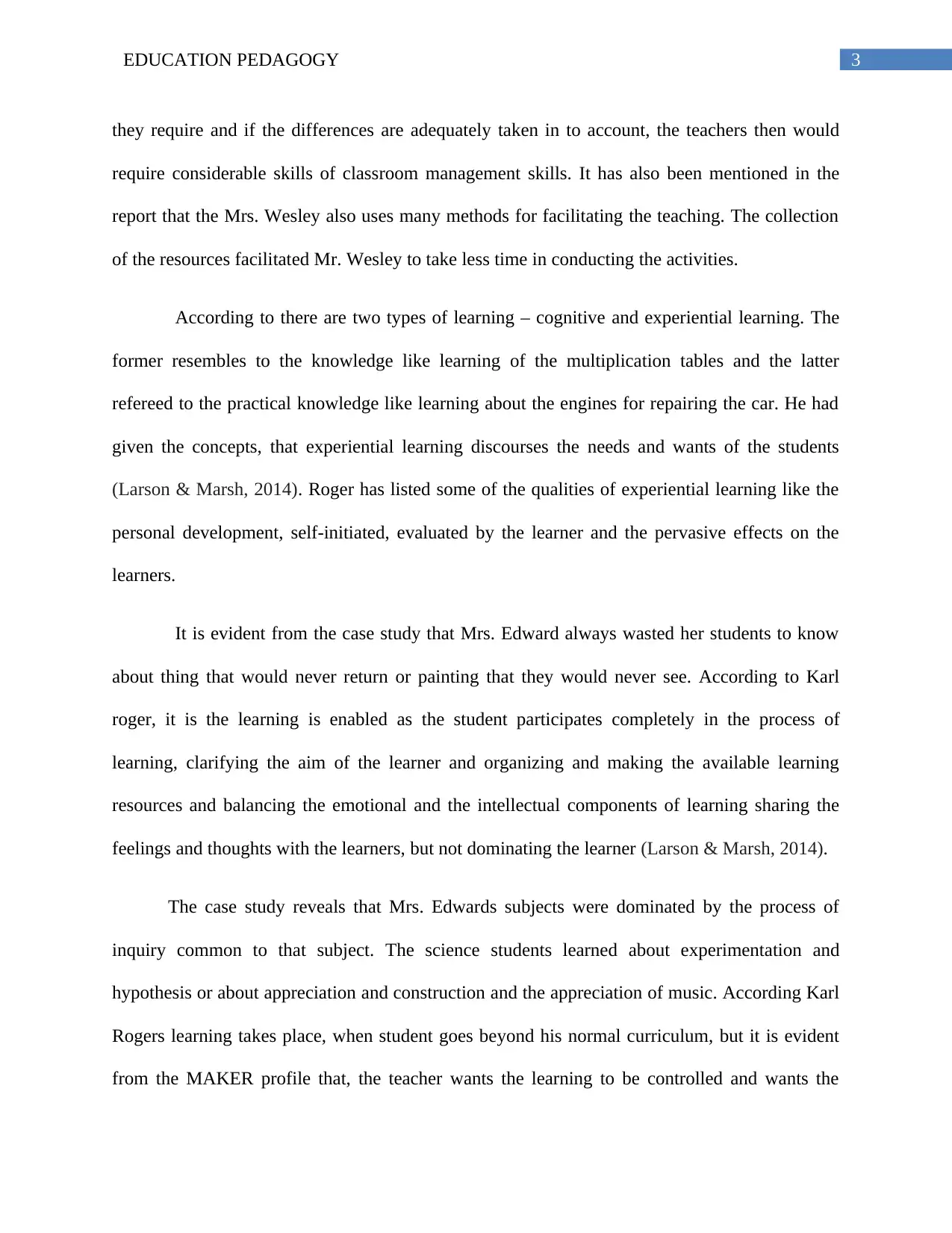
3EDUCATION PEDAGOGY
they require and if the differences are adequately taken in to account, the teachers then would
require considerable skills of classroom management skills. It has also been mentioned in the
report that the Mrs. Wesley also uses many methods for facilitating the teaching. The collection
of the resources facilitated Mr. Wesley to take less time in conducting the activities.
According to there are two types of learning – cognitive and experiential learning. The
former resembles to the knowledge like learning of the multiplication tables and the latter
refereed to the practical knowledge like learning about the engines for repairing the car. He had
given the concepts, that experiential learning discourses the needs and wants of the students
(Larson & Marsh, 2014). Roger has listed some of the qualities of experiential learning like the
personal development, self-initiated, evaluated by the learner and the pervasive effects on the
learners.
It is evident from the case study that Mrs. Edward always wasted her students to know
about thing that would never return or painting that they would never see. According to Karl
roger, it is the learning is enabled as the student participates completely in the process of
learning, clarifying the aim of the learner and organizing and making the available learning
resources and balancing the emotional and the intellectual components of learning sharing the
feelings and thoughts with the learners, but not dominating the learner (Larson & Marsh, 2014).
The case study reveals that Mrs. Edwards subjects were dominated by the process of
inquiry common to that subject. The science students learned about experimentation and
hypothesis or about appreciation and construction and the appreciation of music. According Karl
Rogers learning takes place, when student goes beyond his normal curriculum, but it is evident
from the MAKER profile that, the teacher wants the learning to be controlled and wants the
they require and if the differences are adequately taken in to account, the teachers then would
require considerable skills of classroom management skills. It has also been mentioned in the
report that the Mrs. Wesley also uses many methods for facilitating the teaching. The collection
of the resources facilitated Mr. Wesley to take less time in conducting the activities.
According to there are two types of learning – cognitive and experiential learning. The
former resembles to the knowledge like learning of the multiplication tables and the latter
refereed to the practical knowledge like learning about the engines for repairing the car. He had
given the concepts, that experiential learning discourses the needs and wants of the students
(Larson & Marsh, 2014). Roger has listed some of the qualities of experiential learning like the
personal development, self-initiated, evaluated by the learner and the pervasive effects on the
learners.
It is evident from the case study that Mrs. Edward always wasted her students to know
about thing that would never return or painting that they would never see. According to Karl
roger, it is the learning is enabled as the student participates completely in the process of
learning, clarifying the aim of the learner and organizing and making the available learning
resources and balancing the emotional and the intellectual components of learning sharing the
feelings and thoughts with the learners, but not dominating the learner (Larson & Marsh, 2014).
The case study reveals that Mrs. Edwards subjects were dominated by the process of
inquiry common to that subject. The science students learned about experimentation and
hypothesis or about appreciation and construction and the appreciation of music. According Karl
Rogers learning takes place, when student goes beyond his normal curriculum, but it is evident
from the MAKER profile that, the teacher wants the learning to be controlled and wants the
Paraphrase This Document
Need a fresh take? Get an instant paraphrase of this document with our AI Paraphraser
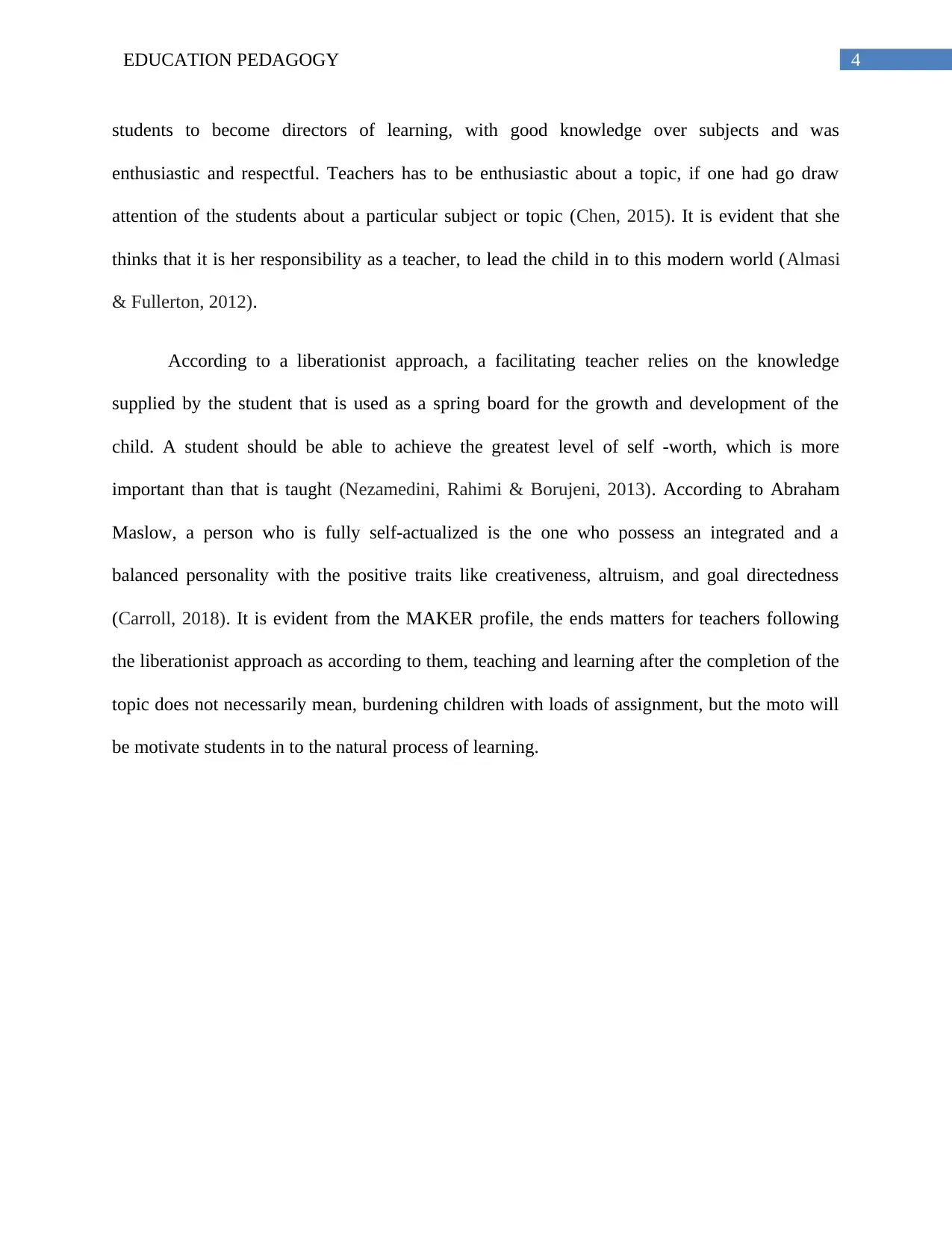
4EDUCATION PEDAGOGY
students to become directors of learning, with good knowledge over subjects and was
enthusiastic and respectful. Teachers has to be enthusiastic about a topic, if one had go draw
attention of the students about a particular subject or topic (Chen, 2015). It is evident that she
thinks that it is her responsibility as a teacher, to lead the child in to this modern world (Almasi
& Fullerton, 2012).
According to a liberationist approach, a facilitating teacher relies on the knowledge
supplied by the student that is used as a spring board for the growth and development of the
child. A student should be able to achieve the greatest level of self -worth, which is more
important than that is taught (Nezamedini, Rahimi & Borujeni, 2013). According to Abraham
Maslow, a person who is fully self-actualized is the one who possess an integrated and a
balanced personality with the positive traits like creativeness, altruism, and goal directedness
(Carroll, 2018). It is evident from the MAKER profile, the ends matters for teachers following
the liberationist approach as according to them, teaching and learning after the completion of the
topic does not necessarily mean, burdening children with loads of assignment, but the moto will
be motivate students in to the natural process of learning.
students to become directors of learning, with good knowledge over subjects and was
enthusiastic and respectful. Teachers has to be enthusiastic about a topic, if one had go draw
attention of the students about a particular subject or topic (Chen, 2015). It is evident that she
thinks that it is her responsibility as a teacher, to lead the child in to this modern world (Almasi
& Fullerton, 2012).
According to a liberationist approach, a facilitating teacher relies on the knowledge
supplied by the student that is used as a spring board for the growth and development of the
child. A student should be able to achieve the greatest level of self -worth, which is more
important than that is taught (Nezamedini, Rahimi & Borujeni, 2013). According to Abraham
Maslow, a person who is fully self-actualized is the one who possess an integrated and a
balanced personality with the positive traits like creativeness, altruism, and goal directedness
(Carroll, 2018). It is evident from the MAKER profile, the ends matters for teachers following
the liberationist approach as according to them, teaching and learning after the completion of the
topic does not necessarily mean, burdening children with loads of assignment, but the moto will
be motivate students in to the natural process of learning.
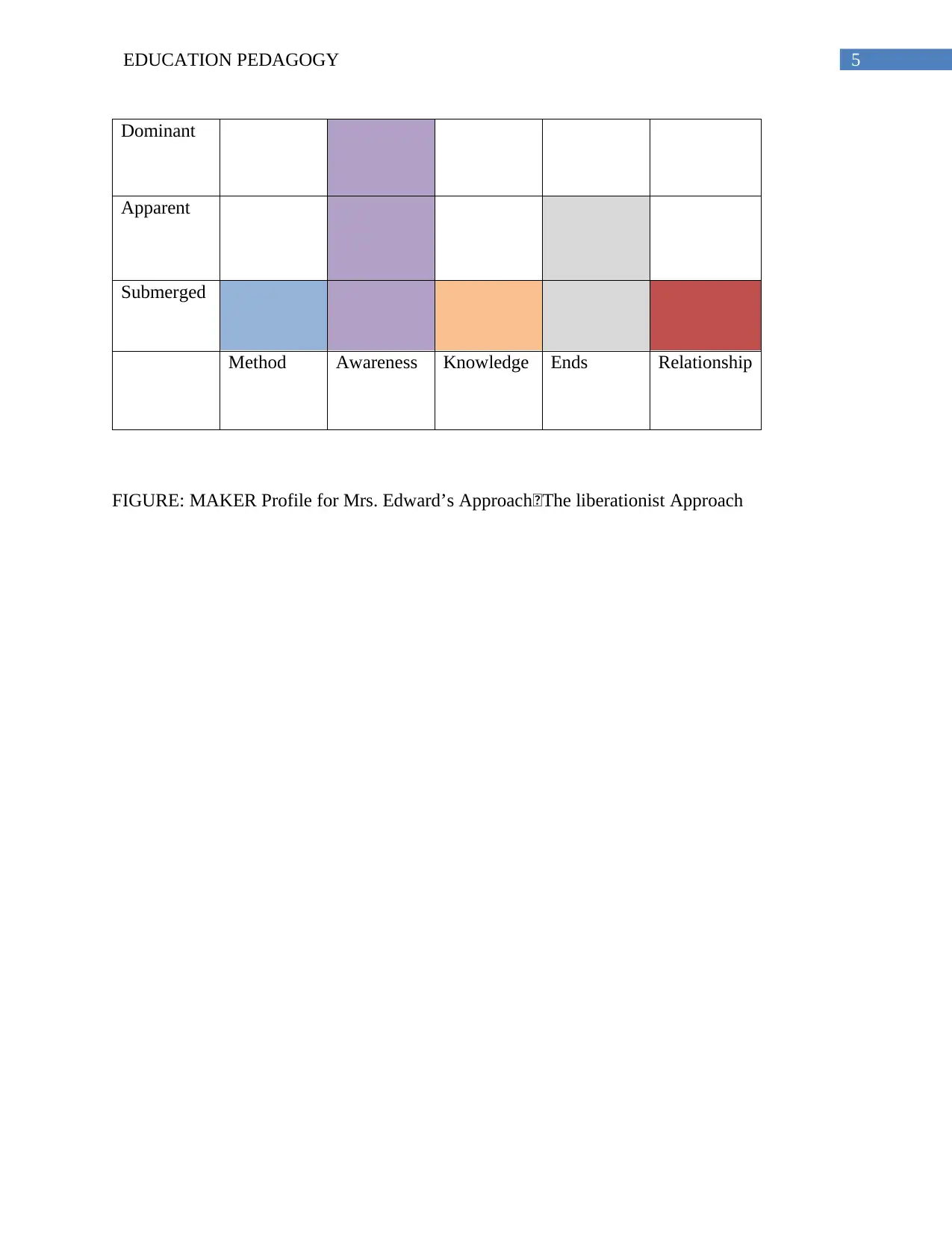
5EDUCATION PEDAGOGY
Dominant
Apparent
Submerged
Method Awareness Knowledge Ends Relationship
FIGURE: MAKER Profile for Mrs. Edward’s Approach-The liberationist Approach
Dominant
Apparent
Submerged
Method Awareness Knowledge Ends Relationship
FIGURE: MAKER Profile for Mrs. Edward’s Approach-The liberationist Approach
⊘ This is a preview!⊘
Do you want full access?
Subscribe today to unlock all pages.

Trusted by 1+ million students worldwide
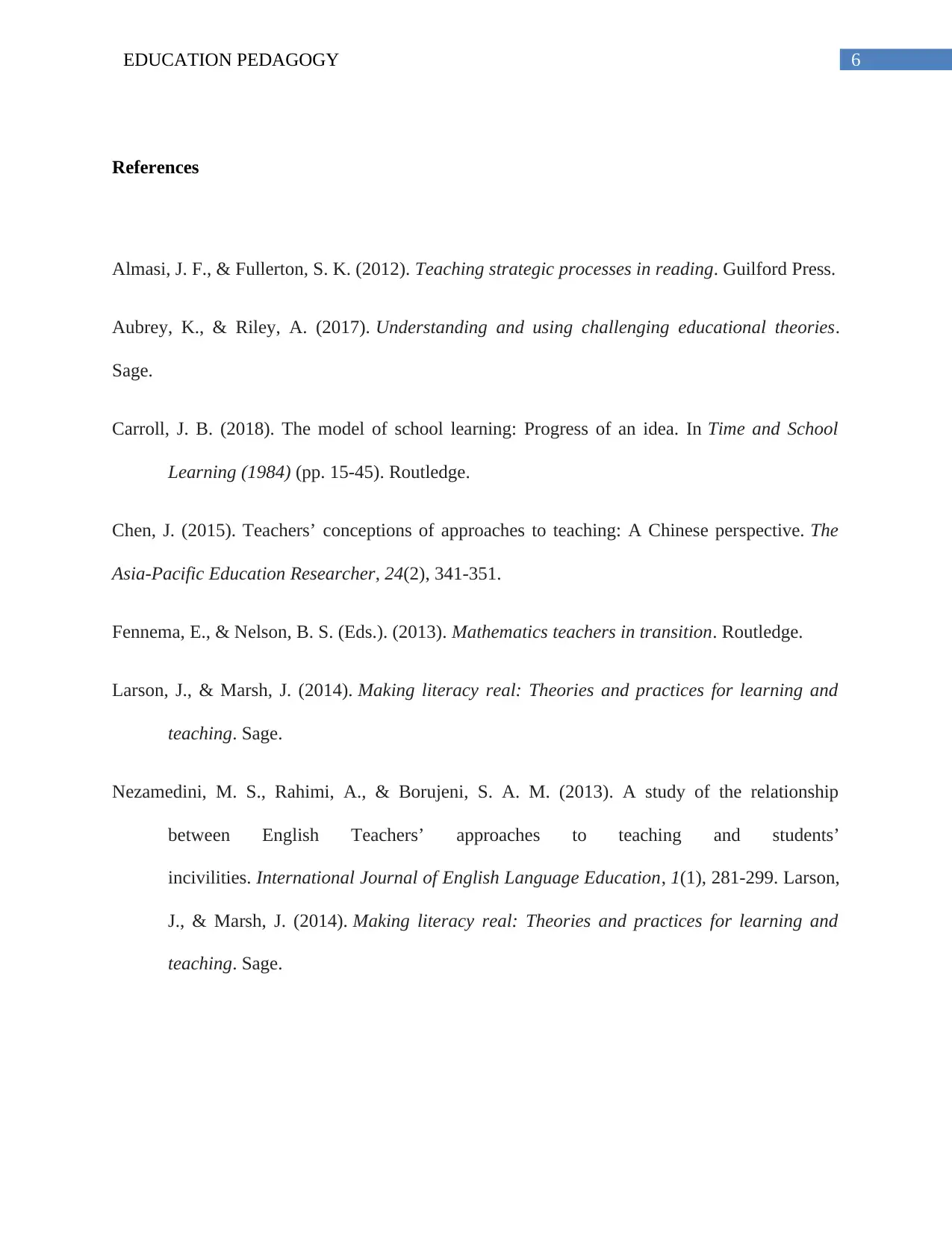
6EDUCATION PEDAGOGY
References
Almasi, J. F., & Fullerton, S. K. (2012). Teaching strategic processes in reading. Guilford Press.
Aubrey, K., & Riley, A. (2017). Understanding and using challenging educational theories.
Sage.
Carroll, J. B. (2018). The model of school learning: Progress of an idea. In Time and School
Learning (1984) (pp. 15-45). Routledge.
Chen, J. (2015). Teachers’ conceptions of approaches to teaching: A Chinese perspective. The
Asia-Pacific Education Researcher, 24(2), 341-351.
Fennema, E., & Nelson, B. S. (Eds.). (2013). Mathematics teachers in transition. Routledge.
Larson, J., & Marsh, J. (2014). Making literacy real: Theories and practices for learning and
teaching. Sage.
Nezamedini, M. S., Rahimi, A., & Borujeni, S. A. M. (2013). A study of the relationship
between English Teachers’ approaches to teaching and students’
incivilities. International Journal of English Language Education, 1(1), 281-299. Larson,
J., & Marsh, J. (2014). Making literacy real: Theories and practices for learning and
teaching. Sage.
References
Almasi, J. F., & Fullerton, S. K. (2012). Teaching strategic processes in reading. Guilford Press.
Aubrey, K., & Riley, A. (2017). Understanding and using challenging educational theories.
Sage.
Carroll, J. B. (2018). The model of school learning: Progress of an idea. In Time and School
Learning (1984) (pp. 15-45). Routledge.
Chen, J. (2015). Teachers’ conceptions of approaches to teaching: A Chinese perspective. The
Asia-Pacific Education Researcher, 24(2), 341-351.
Fennema, E., & Nelson, B. S. (Eds.). (2013). Mathematics teachers in transition. Routledge.
Larson, J., & Marsh, J. (2014). Making literacy real: Theories and practices for learning and
teaching. Sage.
Nezamedini, M. S., Rahimi, A., & Borujeni, S. A. M. (2013). A study of the relationship
between English Teachers’ approaches to teaching and students’
incivilities. International Journal of English Language Education, 1(1), 281-299. Larson,
J., & Marsh, J. (2014). Making literacy real: Theories and practices for learning and
teaching. Sage.
1 out of 7
Related Documents
Your All-in-One AI-Powered Toolkit for Academic Success.
+13062052269
info@desklib.com
Available 24*7 on WhatsApp / Email
![[object Object]](/_next/static/media/star-bottom.7253800d.svg)
Unlock your academic potential
Copyright © 2020–2026 A2Z Services. All Rights Reserved. Developed and managed by ZUCOL.





